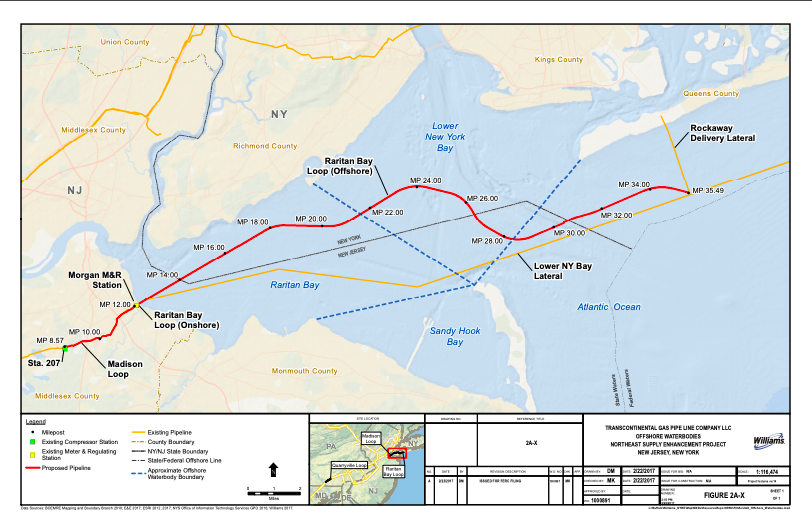DEC Blocks Williams Pipeline Project


The New York State Department of Environmental Conservation (DEC) announced on Friday, May 15, their denial of the required Clean Water Act Section 401 Water Quality Certification (WQC) for National Grid’s proposed Northeast Supply Enhancement (NESE) pipeline project, effectively blocking construction on the project.
The project, which would have carried natural gas from Pennsylvania under New York harbor and out to the Rockaways through an extension of the existing Transco pipeline, has been a source of immense grief for the Brooklyn community. When the state denied approval to Oklahoma-based company Williams, which operates the Transco pipeline, for the project back in May, National Grid quickly announced that they would not process any new applications for gas until the project was approved. While National Grid ended the moratorium in November, thousands of Brooklyn residents and business owners were left without gas for months.
The project has also met considerable opposition from Brooklyn representatives like Representative Nydia Velazquez and Public Advocate Jumaane Williams, along with activist organizations and Brooklyn residents. The project had drummed up controversy over the fact that it would pose significant risks to marine life and perpetuate New York’s reliance on natural gas if it was approved. Citing these and other reasons, DEC chose not to support the project.
“DEC has determined construction of the NESE pipeline project would not meet New York State’s rigorous water quality standards,” the DEC stated Friday.
“Construction of the proposed project would result in significant water quality impacts resulting from the re-suspension of sediments and other contaminants, including mercury and copper, and would disturb sensitive habitats, including shellfish beds and other bottom-dwelling marine life, clearly demonstrating that a default mixing zone is not appropriate for this project. New York is not prepared to sacrifice the State’s water quality for a project that is not only environmentally harmful but also unnecessary to meet New York’s energy needs.”
Assembly Member Robert Carroll, who, along with Senator Kevin Parker and Public Advocate Jumaane Williams, has been vocal in his opposition to the pipeline, told Bklyner that the DEC’s decision is “phenomenal.”
“It’s great that there’s finality to this,” the Assembly Member said. “We’ve been fighting for two and a half years to stop the Williams pipeline. Now, there’s closure to this.”
The project was “a bad decision from the beginning,” he said. “Having a fracked natural gas pipeline go through New York harbor is not the sort of infrastructure investment that we should be doing right now when we’re trying to meet the goals of the CLCPA, and those goals are not going to be met by creating more natural gas infrastructure. So this was the right decision.”
Now, the Assembly Member said, “we need to start investing in more renewable resources — wind, solar, geothermal — so that we can meet the energy needs of individuals in New York.”
The decision was also a victory for activist organizations like Sane Energy Project, which has fought against the project since it was announced in May 2017.
“We’ll look back on this as the moment New York City began getting off fracked gas,” Lee Ziesche, an organizer with Sane Energy Project and a member of the Stop the Williams Pipeline Coalition, told Bklyner over email. “The DEC denied this pipeline because they knew it would not only harm New York Harbor, but because there’s no need for it and it would go against New York State climate law. The DEC decision was final and Williams can’t reapply this time so now we need to focus on making sure National Grid doesn’t build other fracked gas alternatives like the MRI pipeline and Greenpoint LNG facility expansion in North Brooklyn.”
We reached out to National Grid to ask how they feel about DEC’s decision, and how it will impact their long-term plans for NESE. National Grid media representative Karen Young did not respond directly to this question, but did provide the following response: “We will continue to work with New York State on a final long-term solution as outlined in the Supplemental Report to solve for the natural gas capacity issue facing our region.”
Laura Creekmur, vice president of Communications and Corporate Social Responsibility for Williams, provided the following statement, which the DEC forwarded to us over email.
“We are disappointed with the decisions of New York and New Jersey to deny the NESE project’s permits. While we continue to believe in the fundamentals of this project, we will not refile in New Jersey or New York at this time. The decision to pause this important infrastructure project is unfortunate for the region as the design and construction would have generated valuable economic activity in Pennsylvania, New Jersey and New York and would have directly and indirectly supported more than 3,000 jobs during the construction period.
Natural gas remains a critical part of our country’s energy mix that creates affordability for utility customers and ensures reliability while renewables scale. Williams is committed to meeting the demand for a clean alternative to heating oil and diesel, and we are prepared to deliver reliable and affordable natural gas to meet the clean energy needs in the areas in which we operate.”
The article has been corrected to show that the NESE project was first announced in May 2017, not May 2019, as it had previously stated.




